|
Iceland's Akureyri – Say What?
Larry Larsen
The small city of Akureyri on Iceland's northern coastline is the country's second cruise ship port,
but it boasts some of Iceland's most interesting and beautiful natural attractions. The town with the interesting name and a population of around 20,000 is just an hour or so away from many
scenic wonders that we wanted to check out on a recent visit to the "bucket list" location. The unique landscape easily embraces the few small villages and isolated farms which lie just off the
road through the enchanted lands.
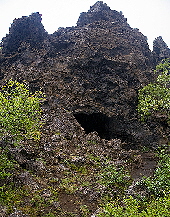
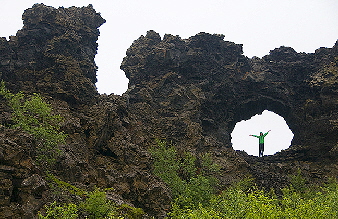 One of the most interesting natural sights during our visit was Dimmuborgir (meaning "dark forts"), and it was a rain-darkened day when we toured the
unique grounds. These formations are a result of a volcanic eruption a couple of thousand years ago. When the
hot lava flowed over wet areas, the water began to boil and the steam created "shells" that, when cooled, remained in place and hardened into various shapes, tunnels, caves and pillars. The
Gongustigar (walking paths) are like walking through a forest of lava, which to this day continues to change. Numerous trails lead through a very large area of these lava fields. One of the most interesting natural sights during our visit was Dimmuborgir (meaning "dark forts"), and it was a rain-darkened day when we toured the
unique grounds. These formations are a result of a volcanic eruption a couple of thousand years ago. When the
hot lava flowed over wet areas, the water began to boil and the steam created "shells" that, when cooled, remained in place and hardened into various shapes, tunnels, caves and pillars. The
Gongustigar (walking paths) are like walking through a forest of lava, which to this day continues to change. Numerous trails lead through a very large area of these lava fields.
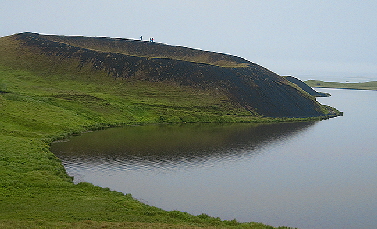
Nearby, Lake Myvatn lies near the Krafla
volcano, which was created 2,300 years ago by volcanic activity. The serene waters attract numerous birds to a protected nesting area on the northwest side in the summertime and is
part of the Laxa-Myvatn Nature Conservation Area. Also surrounding the lake is the dormant Hverfell Mountain on the east side and some very interesting "pseudo-craters" that are scattered
throughout.
Ever heard of a pseudo-crater before?
One looks like a volcanic crater but it is not. Lava has not erupted from a pseudo-crater. Instead it is formed by steam explosions when lava crosses over water, shaping the
earth into shallow bowls at the site of the steam explosion. Walking to the top of some of these pseudo-crates offers a great scenic view of the lake and its surrounding landscape.
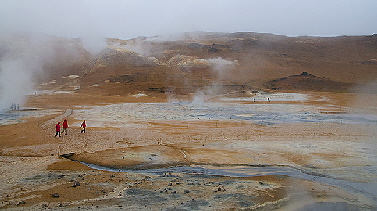 Close by are the geothermal fields near Namafjall Mountain. At the foothills of this spectacular volcanic mountain are numerous sulphuric hot springs, including
fumaroles, mud pools and mud pots that are continually boiling and blowing steam upwards. Many of these mud craters in this geothermal field are gigantic, and
surprisingly, visitors are allowed to walk very near to them. Close by are the geothermal fields near Namafjall Mountain. At the foothills of this spectacular volcanic mountain are numerous sulphuric hot springs, including
fumaroles, mud pools and mud pots that are continually boiling and blowing steam upwards. Many of these mud craters in this geothermal field are gigantic, and
surprisingly, visitors are allowed to walk very near to them.
Our final stop on a bus tour was perhaps
the most beautiful and impressive natural attraction of all. Godafoss Falls (Waterfall of the Gods) was
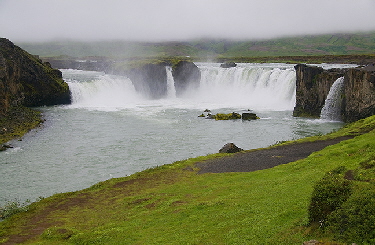 relatively small, but spectacular in its own right. It is like a mini-Niagara Falls, and much more accessible to the public. Shaped
like a horseshoe with only a couple of boulders separating the thundering falls, and surrounded by volcanic rocks, legend says that when Iceland converted to Christianity, the statues of
the Nors gods were thrown into the falls. relatively small, but spectacular in its own right. It is like a mini-Niagara Falls, and much more accessible to the public. Shaped
like a horseshoe with only a couple of boulders separating the thundering falls, and surrounded by volcanic rocks, legend says that when Iceland converted to Christianity, the statues of
the Nors gods were thrown into the falls.
We were running short of time, and
didn't have the opportunity to walk the trail that bordered the river to the bottom of the falls. But we feel the effort to do so would be worth it, and we will do it when we return!
|